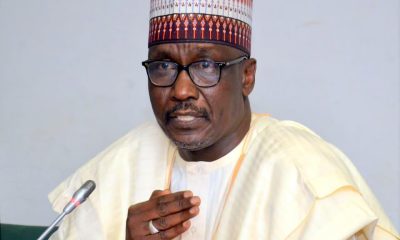Nigeria News
FEC Releases N3.09B For Ogoni Land Clean-Up Project

The Federal Executive Council (FEC) presided over by President Muhammadu Buhari on Wednesday approved another tranche of five contracts totaling N3.09 billion to continue remedial work on Ogoni land environmental reclamation project.
This project is sequel to the United Nations Environmental Programme (UNEP) report, which Buhari flagged-off the project in 2016. Sixteen contracts had earlier been awarded for the project.
Other approvals by FEC include a TETFUND intervention contract of N613.3 million for the construction of Faculty of Arts complex at Adamawa State University, and Nigeria’s signing of the Safe School Initiative to make schooling and education safe in the country.
A contract augmentation was approved for the completion of Enugu water supply scheme, reviewing the contract sum from N985 million to N1.15 billion.
Recall that government, through the Nigerian National Petroleum Corporation (NNPC), and multi-national oil companies had mobilized $180 million for the exercise.
A total of 21 contractors were picked for the clean-up and have been mobilized to the site since the last quarter of 2018.
Victims Of Terrorism, Flood To Get N27.46bn As Palliatives
Meanwhile, the Federal Government on Wednesday also approved over N27.46 billion as intervention funds for victims affected by terrorism in seven states, including farmers who suffered losses as a result of flooding in 2018.
The approval was part of resolutions at the FEC meeting.
Vice chairman of the National Food Security Council and Kebbi State governor, Atiku Bagudu, who was part of the meeting, told State House correspondents that the intervention funds were in two tranches.
Specifically, Adamawa, Benue, Borno, Plateau, Taraba, Yobe and Zamfara states were shortlisted as initial beneficiaries in the security crisis that engulfed them in the better part of the current administration. They are to share N8.5 billion.
For the flood, states like Adamawa, Anambra, Beyelsa, Benue, Delta, Edo, Jigawa, Kebbi, Kogi, Kwara, Niger, Rivers, Sokoto, and Taraba are expected to share N18.9billion.
Bagudu said: “FEC considered and approved two memos from the national food security council. First, it approved the intervention for states that have been affected by conflicts and insecurity, where many have been displaced from their homes and some are living in Internally Displaced Persons camps.
“While support has been given in terms of accommodation, food, welfare, the national food security council considered the importance of helping them restore their livelihood activities, particularly agricultural activity.
“Council approved the memo by Mr. President and approved ₦8, 558,529,755 for intervention in Adamawa, Benue, Borno, Plateau, Taraba, Yobe and Zamfara.
“The beneficiaries are estimated about 69,872 people. The intervention includes the provision of fertilizer, seedlings, chemicals, poultry, and animals to enable them to resume economic activity.
“Secondly, the council considered and approved the submission which originated from national food security council on states that have been severely affected by flooding.
“It is not an exhaustive list because the National Emergency Management Agency statutorily provides for all states that experience one emergency or another.
“Last year, there was an unusual amount of flooding in some states, about 14 of them, and the national food security council considered the impact of that flooding on the agricultural sector, food security, animal husbandry and fisheries.
“And, so, today the council approved an intervention totaling N18, 942,818,912.14.
“Contracts would be awarded to 15 companies to provide seedlings, agro-chemicals , and fertilizers to 163,117 beneficiaries located in 14 states.
“The states are Adamawa, Anambra, Beyelsa, Benue, Delta, Edo, Jigawa, Kebbi, Kogi, Kwara, Niger, Rivers, Sokoto, and Taraba.
“As part of the work of national food security council, other interventions have been considered and are being worked upon by the beneficiary community and also the livestock sector.”












